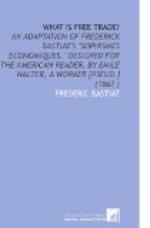Would not one say, who listened only to this language, that we political economists, in merely claiming for every one the free disposition of his own property, had, like the Fourierists, conjured up from our brains a new social order, chimerical and strange; a sort of phalanstery, without precedent in the annals of the human race, instead of merely talking plain meum and tuum It seems to us that if there is in all this anything utopian, anything problematical, it is not free trade, but protection; it is not the right to exchange, but tariff after tariff applied to overturning the natural order of commerce.
But it is not the point to compare and judge of these two systems by the light of reason; the question for the moment is, to know which of the two is founded upon experience.
So, Messrs. Monopolists, you pretend that the facts are on your side; that we have, on our side, theories only.
You even flatter yourselves that this long series of public acts, this old experience of the world, which you invoke, has appeared imposing to us, and that we confess we have not as yet refuted you as fully as we might.
But we do not cede to you the domain of facts, for you have on your side only exceptional and contracted facts, while we have universal ones to oppose to them; the free and voluntary acts of all men.
What do you say, and what say we?
We say:
“It is better to buy from others anything which would cost more to make ourselves.”
And on your part you say:
“It is better to make things ourselves, even though it would cost less to purchase them from others.”
Now, gentlemen, laying aside theory, demonstration, argument, everything which appears to afflict you with nausea, which of these assertions has in its favor the sanction of universal practice?




